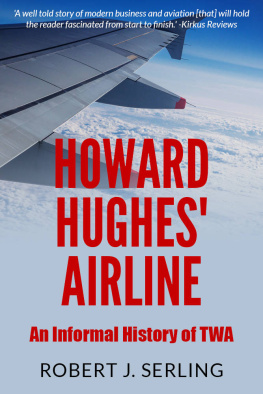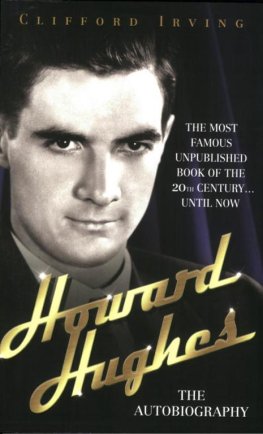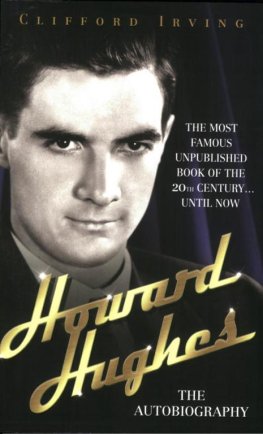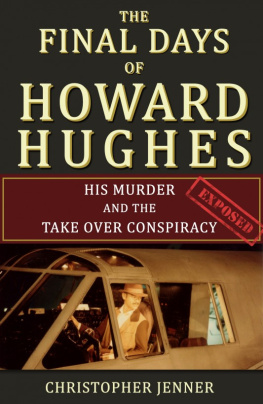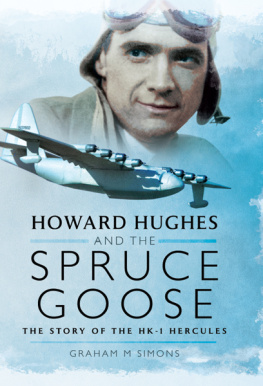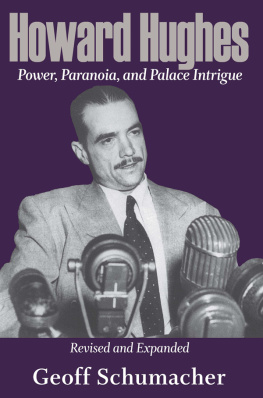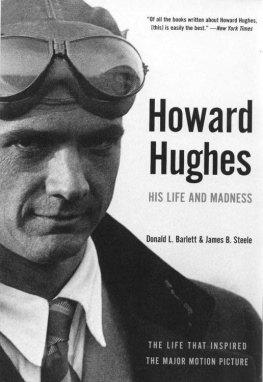HOWARD HUGHES AIRLINE
An Informal History of TWA
Robert Serling
Robert Serling 1983
Robert Serling has asserted his rights under the Copyright, Design and Patents Act, 1988, to be identified as the author of this work.
First published in 1983 by St. Martins.
This edition published in 2017 by Endeavour Press Ltd.
To John Corris and Jerry Cosley of TWA, without whose help and support this could not have been written
Table of Contents
Prologue
They gather in clusters around the hotel lobby, each group a tiny island of old comradeships being refueled by the nostalgia of mutual remembrances.
On their heads are golf caps in red and white, the colors of the airline they once served. This is one of the gatherings of the TWA Seniors Club, some 5,000 retired employees organized into regional chapters; their accumulated airline experience adds up to at least 125,000 years, for TWA is one of the nations oldest air carriers, and most of the members spent at least twenty-five years in its service.
There are senior captains forced to retire by federal edict at age 60 but who look young and fit enough to fly a Boeing 747 that same afternoon. There also are the veterans of the Ford trimotor and Fokker F-10 days, men who move slowly and laboriously but whose eyes sparkle when they spot a fellow airman from their own era. The years drop from stooped shoulders, the tired lines evaporate from leathery faces, as they recall and remember:
... and when the prop left that Alpha , it took the whole damn engine with it and old Harry was left with nothin but a tail - heavy glider ...
... My God , could those DC - 2s pick up ice ... I remember one trip outa Pittsburgh and we ran into precip she was flying like an iron bathtub ...
Mechanics:
... the goddamn engine wouldn't start because it needed a new condenser which we didn't have . So I built one out of a sardine can ...
Hostesses:
... girdles and tight bras Lord , all we needed were chastity belts ...
Reservations agents:
... he was courting this opera singer in New York and we booked him on a transcontinental flight once a week for twenty - six weeks ...
Characters:
... he was the only captain I ever knew whod take off his uniform as soon as he boarded and fly across the Atlantic in his pajamas ...
Incidents:
... a belly landing on railroad tracks . Nobody got a scratch , but one woman became hysterical because a blanket fell over her head and she thought she had gone blind ...
Nuggets mined out of memories, stories mostly pried from the common denominator of virtually all airline people, a sense of humor; the ability to laugh in the face of adversity, or at least to remember all the adversity with a kind of wry perspective that is roughly akin to that of battle survivors. This is natural, for airline humor is like military humor. It is based largely on reminiscences of mistakes, bumbling and inanities that somehow acted as life jackets in every sea of crisis.
Thus, the sound of laughter is an integral part of every Seniors meeting warm, infectious laughter from men and women whose airline lives have combined the routine and the raucous, the dull and the daring, the commonplace and the crises. This, of course, is true of the entire airline industry and its breed. Every air carrier history is similar almost to the point of repetition, just as the human cast of each airline has its identical counterparts on another. The plots, characters, events and tribulations are virtually interchangeable companies started on shoestrings and then riding an economic roller coaster that soars to prosperity one minute and near-bankruptcy the next.
Yet there is something unique about TWA; it doesnt quite fit the mold. Its travails were not only more convulsive than most but seldom were the fault of the airline and its people. As much as any other airline in the world, TWA is a carrier built on a foundation of loyalty that has withstood the terrible buffeting of decisions, deeds and circumstances beyond the control of officers and employees alike.
This is reflected in the atmosphere of a Seniors meeting, where one can sense the unity and pride that helped the airline survive. Admittedly, a large measure of this exists with every carrier, but at TWA it seems to have been applied with a branding iron. Another airline that equals it is Delta, but this is comparing oranges with apples; Deltas sense of unity and pride grew out of a special brand of management paternalism thriving naturally and easily in an atmosphere in which loyalty was projected downward as well as upward, whereas TWAs was a simple yet powerful weapon of survival amid constant management instability. There was more than one occasion when loyalty was the only glue that held TWA together. It was and still is the pivot around which the airline revolves.
Retiree business cards carry the title Goodwill Ambassador under each seniors name, cards they leave at travel agencies where they regularly drop off TWA schedules and brochures. They don special red blazers and on their own time, with no compensation, act as tour guides at major TWA bases. On October 3, 1982, the last day of the major league baseball season, a retired captain named Harold Neumann, whose retirement avocation is sky-writing, climbed into his airplane and flew over the Kansas City Royals Stadium. Some 30,000 fans saw him write FLY TWA three times. The stunt cost him $300.
They never cease trying to sell their old airline, yet these are men and women with memories of times they couldnt get their paychecks cashed because of rumors that TWA was broke, of times when the airline was run by committee because it had no president, of times when they competed against modern jets with obsolete piston aircraft. They still have the blessed resilience, so typical of the airline breed, that saw them through those troubled periods. When they themselves travel, they uncomplainingly sweat out each boarding, cognizant that their relatively low priority passes leave them vulnerable to being bumped by a last-minute paying passenger or somebody with a higher priority pass. With the wiliness of coyotes, they have learned how to avoid most such hassles, carefully choosing certain flights on certain days or perhaps relying on the sympathy of their still-employed modern counterparts who look upon the retirees with a kind of someday-Fll-be-in-their-shoes awareness. Even so, the combination of operational knowledge and fraternal camaraderie doesnt always work; the most patient person in the world has to be an ex-airline employee with first-hand experience of what can go wrong on any given flight, from overbooking to bad weather to mechanical delays. They have learned to swallow disappointment, put up with inconvenience, and improvise their way out of being stranded.
Classic is the case of a TWA senior and his wife who were pass-riding from New York to Athens via London and Paris. They were bumped from the flight in Paris and all later Paris-Athens planes were booked solid for the next two days. Staying in Paris had no attraction; they had visited there many times.
Athens is supposed to be the highlight of the trip, the husband observed. Lets try another way to get there.
The other way was simple if circuitous. They flew back to New York and there caught a TWA nonstop to Athens that left only an hour after their Paris flight arrived in Kennedy.
This rather cosmopolitan solution is more than just another jet age story. TWA itself is an unusual hybrid of cosmopolitanism and Midwest provincialism. Its routes are global, but its roots are in Americas heartlands; the core of the airlines technical operations is in Kansas City and has been for almost a half-century. This dual personality can be seen in the very makeup of the Seniors Club; one member may recall the old airmail days while another talks about Spanish art or French cuisine, and a third remembers catering to the demands of prima donna movie stars. A fair-sized proportion of retirees have served in both domestic and international stations, a phenomenon virtually every TWA veteran traces to the influence of one man: Howard Hughes.
Next page
